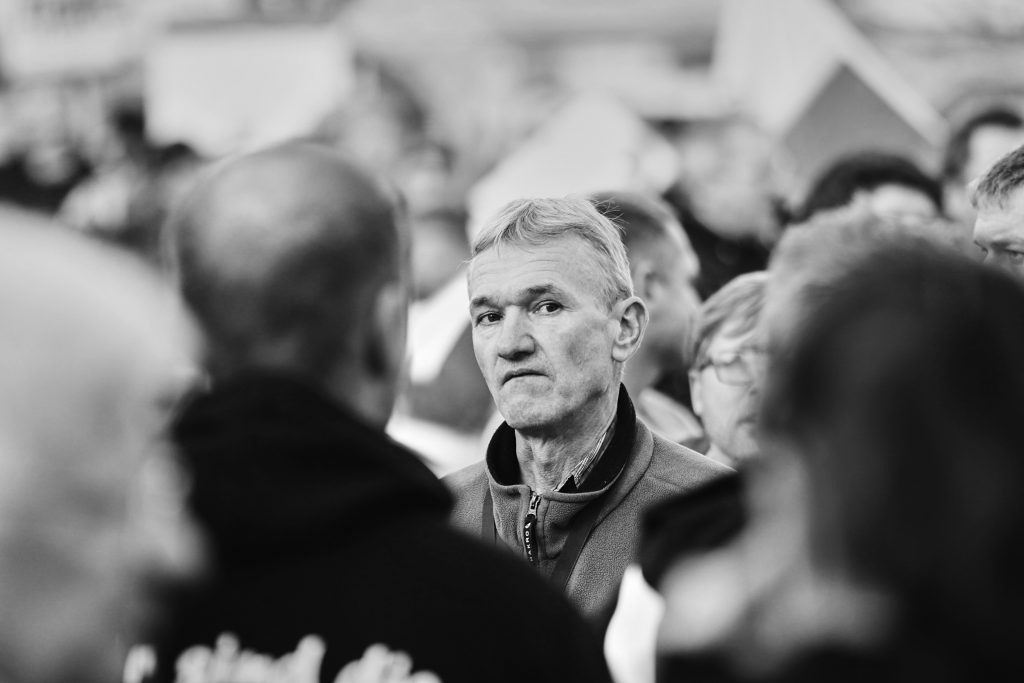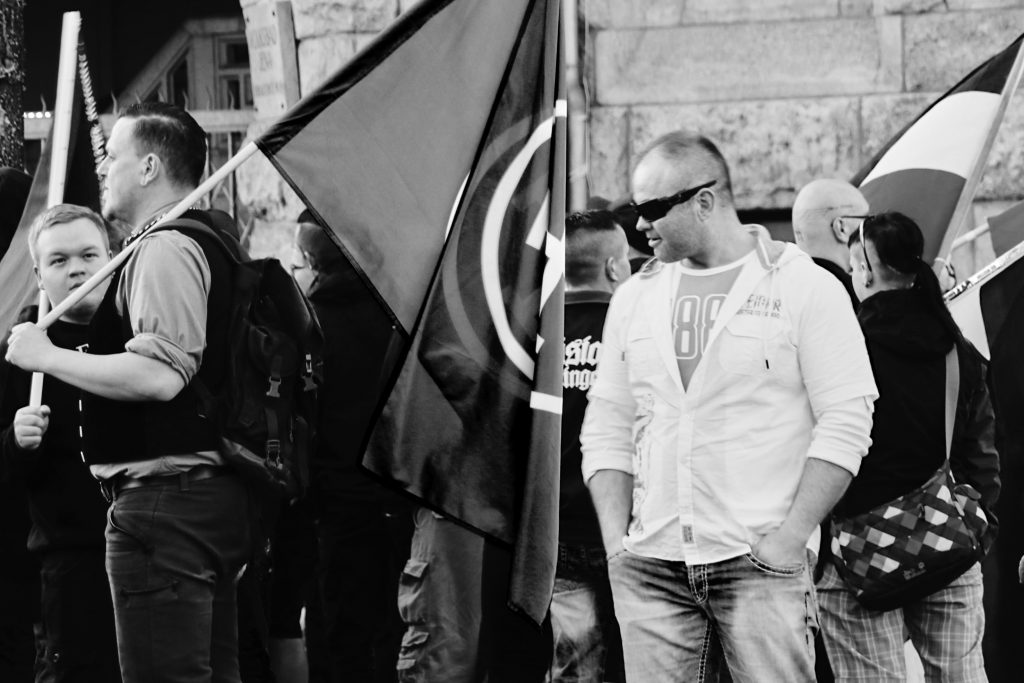Bewährtes Vorgehen
#Thüringen
Im Zuge rassistischer Mobilisierungswellen greifen Neonazis in Thüringen auf alte Strukturen zurück, um gegen Geflüchtete und deren Unterbringung zu hetzen.
Durchschnittlich drei Fälle rechter und rassistischer Gewalt mit mindestens sieben Betroffenen pro Woche ereigneten sich in Thüringen im vergangenen Jahr. Zu diesem Schluss kommt die Betroffenenberatungsstelle ezra in ihrer Jahresstatistik für 2022. Es ist die höchste Zahl an Angriffen, die je durch ein unabhängiges Monitoring im Freistaat registriert wurden. Dabei dürfte die Dunkelziffer noch höher sein. ezra warnt: »Wir haben es in Thüringen mit einer neuen Welle rechter und rassistischer Gewalt zu tun, die sich bereits 2021 abzeichnete.« Die Lage könne im laufenden Jahr jederzeit weiter eskalieren. Eine Bestätigung dieser Einschätzung folgte sieben Tage später bei einem Aufmarsch gegen die Aufnahme von Geflüchteten aus der Ukraine in einem leerstehenden Krankenhaus im südthüringischen Schleusingen.

»Denn es wird eskalieren.«
»Beweist Rückgrat! Wenn ihr nicht für das deutsche Volk da seid, dann klebt das Blut auch an euren Händen. Denn es wird eskalieren«, fordert eine Frau am Mikrofon, eine andere Teilnehmerin plädiert für eine Besetzung des Gebäudes. Rund 600 Personen waren dem Aufruf des langjährig aktiven Neonazis Tommy Frenck gefolgt, die Technik stellte Axel Schlimper, ehemaliger Thüringer Regionalleiter des 2017 aufgelösten Holocaustleugner-Netzwerks »Europäische Aktion«. Beide gehörten schon 2014 zum Organisationskreis von »Südthüringer gegen die Islamisierung des Abendlands« (SügIdA) und von Aufmärschen mit bis zu 1.000 Teilnehmer*innen. Frenck wurde 2014 auch einer Facebook-Gruppe zugerechnet, in der sich Neonazis und Rassisten zu einer rassistischen Hetzjagd im südthüringischen Hildburghausen verabredet hatten. Mit rund zehn Fahrzeugen verfolgten sie einen Kleintransporter mit rumänischen Arbeitern, bedrohten diese und verursachten dabei mehrere Verkehrsunfälle. Sowohl Frenck als auch Schlimper wissen um die mobilisierbaren Strukturen, mit denen sie die rassistische Stimmungsmache anheizen können. Zwei Wochen nach dem ersten Aufmarsch stieg die Zahl der Teilnehmer*innen in Schleusingen erneut an. Zu den Redner*innen gehörte dieses Mal auch Frank Haußner von den rechten Gruppen »Freies Thüringen« und »Patrioten Ostthüringen«. Er verkündigte lautstark das gemeinsame Ziel: »Die Überwindung des BRD-Unrechtsregimes.«
ABO
Das Antifa Magazin
alle zwei Monate
nach Hause
oder ins Büro.
Extrem rechte Allianz in Gera
Im ostthüringischen Gera ist Haußner eine der zentralen Figuren in einer extrem rechten Allianz, die dort während der Pandemie gewachsen ist. Die Stadt ist zu jener Zeit ein Zentrum der Proteste gegen die Corona-Maßnahmen und damit auch rechter Gewalt geworden. Nach Angaben von ezra haben sich im vergangenen Jahr rechte Gewalttaten dort mehr als verdoppelt. Mit den wöchentlichen Montagsaufmärschen sei in Gera ein Angstraum für Menschen entstanden, die nicht in das rechte Weltbild passen. Obwohl Demonstrationen wegen der Pandemie eigentlich verboten waren, gingen dort zeitweise bis zu 3.500 Personen auf die Straße. Neben Haußner gehört der langjährig aktive Neonazi Christian Klar zum Organisationskreis der Aufmärsche, die inzwischen zu einem Sammelbecken von Akteur*innen aus dem Reichsbürgermilieu, Putin-Freund*innen, Impfgegner*innen und militanten Nazis avanciert sind. Der 1980 geborene Klar gehörte bereits Ende der 1990er Jahre zum Umfeld des »Blood&Honour«-Netzwerks in Thüringen und wurde ab 2015 auf den inzwischen von »Sügida« in »Thügida« umbenannten Aufmärschen wieder aktiv, zweimal soll er bereits im Gefängnis gesessen haben.
In dem Ostthüringer Geflecht darf auch die »Alternative für Deutschland« (AfD) nicht fehlen, sie hatte bei den Landtagswahlen 2019 im Wahlkreis Gera II mit knapp 30 Prozent ihr landesweit bestes Ergebnis. Ihr Kandidat Wolfgang Lauerwald holte dort mit knapp 33 Prozent ein Direktmandat. Er sitzt auch im Stadtrat, wo die AfD seit Juni 2019 mit 12 von 42 Sitzen die stärkste Fraktion ist. Die »Nationaldemokratische Partei Deutschlands« (NPD) hatte es nach zwei Legislaturperioden nicht wieder in das Kommunalparlament geschafft. Rund ein Jahr später sorgte die Wahl des AfD-Mannes Reinhard Etzrodt zum Stadtratsvorsitzenden in Gera bundesweit für Aufsehen. Der pensionierte Arzt war mit 23 von 40 abgegebenen Stimmen gewählt worden, elf Stimmen mehr als die AfD hat. Auch der AfD-Direktkandidat Stephan Brandner gewann bei der Bundestagswahl 2021 mit 29 Prozent der Erststimmen im Wahlkreis 194 und zog mit einem Direktmandat erneut in den Bundestag ein.

»Wir sind die Ersten von morgen«
Als am 3. Oktober 2022 in Gera nach Polizeiangaben knapp 10.000 Personen beim »Fest der Freiheit« auf die Straße gingen, machte der AfD-Landtagsfraktions- und Landesvorsitzende Björn Höcke klar, worum es den Organisator*innen ging. Er warnte vor dem »Regenbogenimperium« und den »Konsumfaschisten« und rief zum Kampf für die Familie als Keimzelle eines guten »Volkskörpers« auf. »Gera ist heute der Anfang von etwas Neuem. Wir sind die Ersten von morgen«, rief Höcke und griff damit einen völkischen Leitspruch auf. Beim anschließenden Aufmarsch lief er in der ersten Reihe gleich neben dem Reichsbürger Haußner, der neben Klar für die Organisation verantwortlich war. Auch der ehemalige CDU-Bundestagsabgeordnete Albert Weiler nahm an dem Aufmarsch teil, während am Rande Gegendemonstrant*innen bedrängt und migrantisierte Personen mit »Abschieben«-Rufen bedroht wurden. Längst hat sich in Gera eine mosaikförmige Rechte etabliert, die auch überregional gut vernetzt ist. Publizistische Rückendeckung erhält sie vom Anzeigenblatt »Neues Gera« und ihrem Herausgeber, dem Vorsitzenden der AfD-Stadtratsfraktion, Harald Frank. Die wöchentlich bis zweiwöchentlich erscheinende Gratiszeitung mit einer Druckauflage von etwa 56.000 Exemplaren ist für viele vor Ort eine Alternative zur kostenpflichtigen Tageszeitung und profitiert von deren stetigem Auflagenrückgang. Neben AfD-Werbung und Texten mit unübersehbarer Nähe zur Partei präsentiert die Zeitung rassistische Inhalte, die der »Neuen Rechten« zuzuordnen sind. Sie begleitet auch die neuesten Aktivitäten in Gera unkritisch und teils wohlwollend. Der Unternehmer Peter Schmidt ist ebenfalls Teil dieses Mosaiks und hat gleich zwei Netzwerke aufgebaut: »Miteinanderstadt Gera« und die Initiative »Unternehmer mit Herz« mit – nach eigenen Angaben – rund 1.200 beteiligten Unternehmen. Regelmäßig führt er auf den Aufmärschen Spendensammlungen durch. Bei einer von ihm organisierten »Weihnachtsfeier« durfte der neonazistische Liedermacher Frank Rennicke sein völkisches Repertoire präsentieren. Die Mobile Beratung in Thüringen (mobit) konstatiert zudem, dass der Szene durch eine solche Beteiligung von Unternehmen nötige Infrastruktur für Veranstaltungen zur Verfügung gestellt wird. Letztere gleichen in der Region Gera mittlerweile einem Schmelztiegel aus Parteien und Gruppierungen wie AfD, NPD, »Freies Thüringen« und »Freie Sachsen«, PEGIDA und »Compact« mit direkter Anbindung an die regionale Reichsbürgerszene und ihre Netzwerke.
Erwartbare rassistische Übergriffe
Abgrenzungen untereinander gibt es wenig, dafür herrscht in der Region oftmals ein leichtfertiger kommunaler Umgang mit dem Netzwerk vor. Als dieses im Februar 2023 einen »politischen Aschermittwoch« veranstaltete, konnten sich die Organisator*innen auf die CDU-Bürgermeisterin von Ronneburg in Ostthüringen verlassen, die ihnen die städtische Halle vermietete. Anschließend berichtete die tageszeitung: »Auf der Bühne standen Mädchen in BDM-ähnlicher Kleidung, der NPD-Szenesänger Frank Rennicke trällerte Lieder. Jürgen Elsässer, Herausgeber des rechtsextremen Compact-Magazins, wetterte gegen die Grünen, ‹diese Bagage muss weg›. (…) Und der Mitorganisator und Geraer Rechtsextremist Christian Klar drohte einem Journalisten namentlich, dieser sei ein ‹Häufchen Mensch› und gehöre für seine Berichte bestraft.« Eine antifaschistische Demonstration am 1. Mai richtete sich gegen einen Aufmarsch dieses Netzwerks und wurde von der Polizei eingekesselt. Die Teilnehmer*innen wurden über sechs Stunden drangsaliert, während rechte Aktivist*innen die Szenerie filmten. Entsprechend groß war anschließend in den Telegram-Gruppen das Lob für die Polizei. Angesichts des ohnehin zu beobachtenden Themenwechsels in der extrem rechten Szene ist zu erwarten, dass die rassistische Mobilisierung auch in dem Ostthüringer Netzwerk ganz oben auf der Agenda stehen wird. Mit der Schaffung von Angstzonen und No-go-Areas während der Aufmärsche und Aktionen ist der Anfang bereits gemacht.
Der Beitrag Bewährtes Vorgehen erschien zuerst auf der rechte rand.